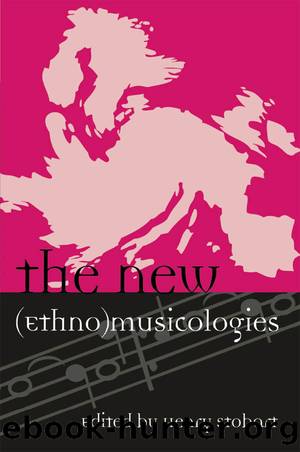The New (Ethno)musicologies by unknow

Author:unknow
Language: eng
Format: epub
Publisher: Scarecrow Press
Published: 2008-08-15T00:00:00+00:00
Because of activismâs plurality, there is and can be no single model for ethnomusicologists to âact despite imperfect knowledge.â Embracing that plurality begins by thinking and acting historically, recognizing that resistance against the hegemony of Western history has assumed many forms. It is a plurality that bears witness to the presence of music at colonial encounter or as fundamental to shaping the racial imagination. It is a resistance that gives voice to the voiceless and that perceives order in music that might otherwise be dismissed as disorder. It opens paths of activism that strive for inclusivity rather than exclusivity, tolerance rather than privilege. It insists that music and ethnomusicology can make history, and that they are far more than traces that record historyâs hegemony.
The intervention of history that provides the context for the present essay illustrates one of the most pervasive hegemonies of the present, the insistence of many Western political leaders that there is a single enemy against which Western civilization must struggle. Naming the enemy insists on singularity, whether it goes under the name of âterrorismâ or âIslamism.â The war against such singular enemies, in fact, would not be possible without singularity on both sides, for it is âcivilizationâ that does battle with âterrorism.,â and it is âthe Westâ that does battle with âIslamism.â The failure to recognize that terrorism and Islamism cannot be reduced to singularity does not, and probably cannot, occur to the policy makers for whom civilization has a singular history.
The insistence on singularity, nonetheless, exposes the constructedness of historical hegemonies. Questioning the hegemonies and dismantling them, in contrast, emerge as critical means of potentially resolving the wars and restoring the plurality that hegemony struggles to eliminate. And this is precisely where ethnomusicology stands to play an activist role. Attuned to the voices of the voiceless, ethnomusicology can recognize that Islam is not singular; it can listen to the many movements and individuals comprising Islamism and recognize the potential for counterpoint, that is, the multiple alternatives of alterity. Ethnomusicologists can refuse to be drawn into a war whose rules enforce hegemony rather than liberate difference. Is not, indeed, ethnomusicology more critically aware of the multiple counterhistories that make many voices possible? Should not ethnomusicology be especially sensitive to the silencing of those voices?
I am only too well aware that there are many for whom an activist course in ethnomusicology would be uncomfortable. With some frequency, in fact, I hear the question, Does ethnomusicology have to be activist? It is not my point, nor it is the point of this essay, to answer that question with a simple âyes,â because there is no simple âyes,â just as there is no simple answer to the nature of any ânew ethnomusicologyâ that the essays in this book address. The posing of this question that I so often hear, however, does bear witness to a deeper and more pervasive anxiety about the nature of ethnomusicological knowledge, its very restlessness and restiveness, its insistence that complex rather than simple questions be asked, even when they defy easy answers.
Download
This site does not store any files on its server. We only index and link to content provided by other sites. Please contact the content providers to delete copyright contents if any and email us, we'll remove relevant links or contents immediately.
| Appreciation | Blank Sheet Music |
| Composition | Conducting |
| Exercises | Instruction & Study |
| Lyrics | MIDI, Mixers, etc |
| Philosophy & Social Aspects | Songwriting |
| Techniques | Theory |
| Vocal |
The Goal (Off-Campus #4) by Elle Kennedy(13674)
Kathy Andrews Collection by Kathy Andrews(11834)
Diary of a Player by Brad Paisley(7581)
Assassin’s Fate by Robin Hobb(6218)
What Does This Button Do? by Bruce Dickinson(6207)
Big Little Lies by Liane Moriarty(5804)
Altered Sensations by David Pantalony(5105)
Pale Blue Dot by Carl Sagan(5008)
Sticky Fingers by Joe Hagan(4199)
The Death of the Heart by Elizabeth Bowen(3622)
The Heroin Diaries by Nikki Sixx(3550)
Confessions of a Video Vixen by Karrine Steffans(3309)
Beneath These Shadows by Meghan March(3308)
How Music Works by David Byrne(3270)
The Help by Kathryn Stockett(3149)
Jam by Jam (epub)(3093)
Harry Potter 4 - Harry Potter and The Goblet of Fire by J.K.Rowling(3074)
Computational Linguistics and Intelligent Text Processing: 20th International Conference, CICLing 2019 La Rochelle, France, April 7â13, 2019 Revised Selected Papers, Part I by Alexander Gelbukh(2995)
Strange Fascination: David Bowie: The Definitive Story by David Buckley(2872)
